必修四module3学案
英语必修ⅳ外研版module3教案

高中英语新标准(外研版)必修4 Module 3Body Language and Non-verbal Communication山东烟台招远三中外语组刘刚Aims:1.To learn another way of communication---body language2.To understand the different gestures in different countriesDifficult and main pointsThe usage of the following phrases: more than on guard involve give awayTeaching StepsStep 1: ListeningT: Open your book and turn to page22. Today we are going to learn the “Reading and vocabulary” Let’s see part 1There are four titles, read them and then close books. Listen to the tape carefully to see what the passage is about and choose the correct answer (Play the recorder 3 minutes)When it is over give the students 5seconds to choose the best title. Then check the answer and ask the Ss to give the reasonT: Can you tell us the reason why you choose the first one/ the second /the third /the last?S: (a. b. c. d)Then give the right answer.---Greeting Around the WorldT: Now let’s see Part 2.There are six sentences about the passage, read them quickly and listen to the tape again and decide which ones are true and which are falseListen, you should not only get the answers to the Part 2 , but also check the answer to Part 1(Play the tape again 3 minutes)After it finishes give the students 15 seconds to finish the questions Check the answersT: Who can give us the answers?S: (A.B.C.D)I don’t tell you whether you are right or wrong let’s go to the second step---ReadingStep 2. ReadingT: You have only 2 minutes to read the passage, while you are reading the passage you have two duties one is to check whether your answers in Part 2 are right and find out the right ones, the other is to find and underline the words in the box in Part 3( 2 minutes later)T: Now let’s see Part 2 again. Who can give us the right answers and give the reasons and correct the false ones if necessary..S: (a. b. c. d)T: Please hands up if your answers are all right. (You are very good, the others don’t be discourage, you can succeed, too if you keep working hard, listening and reading more) (检查阅读结果,表扬全对的同学,鼓励有错的,提高他们的积极性)T: OK. Now let’s see the words in the box in Part 3. First read them after me (twice)T: Who would like to guess the meanings according to the context?(Help them if they can’t)T: Now that you have known their meanings, choose them to fill the blanks. Pay attention to their forms ( 3 minutes )T: Now please discuss your answers in pairs and learn the reasons at the same time.Check the answersT: Read the passage carefully again and underline the difficult points you think, after you finish, discuss in pairs or in groups of four to try to solve them. ( 7 minutes )(Write the main points on the blackboard)T: Do you have any questions? If you have, hands up.T: Studentplease tell us your questions.1,S1: …T: Now let’s see who can answer his/her questions. ( If it is difficult for students, help them.)T: Look at the blackboard, please, let’s see the points1. Although these are very important, we communicate with more than just spoken and written wordsMore than: 意思:不仅是,远甚于Hibernation is more than sleep. It is a deep sleep.More than 还有其他用法,1)do more than do sth. = not only do sth.Teachers do more than teach us school lessons. They educate us to be useful persons.2)more than = not only or verya.Hearing the news, he was more than a little angry.b.I am more than satisfied with what you said.c.Don’t force me to say more than I want to2. Like other animals, we are on guard until we know it is safe to relax.On guard : 值班,当班,提防着The solider is on guard.Let us be on our guard against thieves.3. Greetings in Asian countries do not involve touching the other person, but they…involve the handsInvolve:涉及,包括This project involves a lot of workDon’t involve other people in yours trouble.其他用法be involved in 包含在……, 与……有关, 被卷入All the children were involved in the school playHe was involved in working out a plan.be involved in trouble4. People give away much…by their wordsGive away: 散掉, 给掉(钱财等), 泄露, 出卖He gives away all his pictures.Don’t give away the secret.He was given away by one of his companies.Step 3 Speaking ( 5minutes)T: Now we have known that body language can help us communicate and there are different gestures in different countries. The same gesture has different meanings in different cultures.What gestures do you know and what are their meanings, would you like to tell us?T: First I give you two examples:Bow: to show respectWaving your hand: say hello to someoneSs: …Step 4 MemorizingT: Now memorize the content of the passage.课程设计思路:宏观设计:1.学英语目的是听,说,读,写全面提高,本节课的设计主要围绕这一目的设计的,涉及听,说,读三个方面。
高中英语 模块四 Unit3 Tomorrow’s worldtask1导学案 新人教版必修4

Module4 Unit 3 Tomorrow’s worldPeriod 9 Task (1)Ori ginated by Ms. Dai Revised by Ms. Shi and Ms. LiStudying task: Writing an advertisementStudying aims: 1. To Learn how to distinguish between facts and opinions.2. To learn how to ask for information.Self education (自主学习):Skills building 1: distinguishing between facts and opinions1. What is a fact?A fact is a piece of information that is proved to be true.2.What is an opinion?An opinion is a feeling or belief that is not founded on certainty or proof.Pair-work(合作探究)Task 1:Read the seve n sentences in Part A on page 53 and decide whether they arefacts or opinions.1.China has a total land area of over 9.6 million km.2.On 15th Oct ober 2003, the first Chinese person went into space.3.I believe our painting is worth quite a lot of money.4.Suzhou is over 80 km away from Shanghai.5.It seems that people prefer living in flats.6.I think that people who litter should be fined.7.Mr. Wang came home to find his computer broken.Fact: 1, 2, 4, 7Opinion:3, 5, 6Task2:Complete the questions according to the answers (P55):Answers: When , How often, Why, What problem, WhatTarget detection:(目标检测)Step 2: finding o ut about the computer roomRead the guidelines in Part A on page 55. Listen to the recorded interview andcomplete t he interview form.Keys:1.in the afternoon2.three times a week: Monday, Thursday, Friday3.for school work4.keyboards, CPUs, RAM, no DVD-ROM drives, too small hard drives, no Internetconnection, no sound card, slo w and ugly PCs, very old software5.buy new computers and new software1。
人教新目标高中英语必修四Unit3单元教学设计
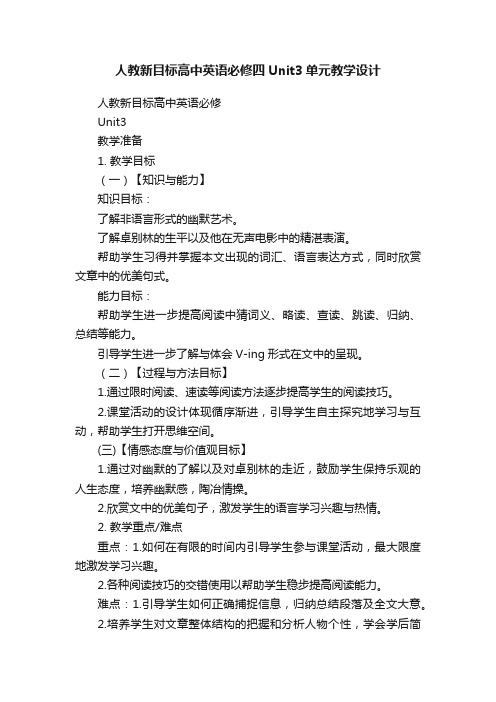
人教新目标高中英语必修四Unit3单元教学设计人教新目标高中英语必修Unit3教学准备1. 教学目标(一)【知识与能力】知识目标:了解非语言形式的幽默艺术。
了解卓别林的生平以及他在无声电影中的精湛表演。
帮助学生习得并掌握本文出现的词汇、语言表达方式,同时欣赏文章中的优美句式。
能力目标:帮助学生进一步提高阅读中猜词义、略读、查读、跳读、归纳、总结等能力。
引导学生进一步了解与体会V-ing形式在文中的呈现。
(二)【过程与方法目标】1.通过限时阅读、速读等阅读方法逐步提高学生的阅读技巧。
2.课堂活动的设计体现循序渐进,引导学生自主探究地学习与互动,帮助学生打开思维空间。
(三)【情感态度与价值观目标】1.通过对幽默的了解以及对卓别林的走近,鼓励学生保持乐观的人生态度,培养幽默感,陶冶情操。
2.欣赏文中的优美句子,激发学生的语言学习兴趣与热情。
2. 教学重点/难点重点:1.如何在有限的时间内引导学生参与课堂活动,最大限度地激发学习兴趣。
2.各种阅读技巧的交错使用以帮助学生稳步提高阅读能力。
难点:1.引导学生如何正确捕捉信息,归纳总结段落及全文大意。
2.培养学生对文章整体结构的把握和分析人物个性,学会学后简介人物。
3. 教学用具4. 标签教学过程Step1: Lead in 2′利用问题为课文讲述埋下伏笔,用卓别林的图片进行导入,并用brainstorming方式发散学生思维,围绕与幽默相关的词汇展开,卓别林正是由于这些与众不同的因素获得成功,从而成功导入本课主题——卓别林。
【设计意图】利用查理卓别林的生活照和剧照以及头脑风暴的方式既活跃了课堂气氛,又激发了学生用英语表达的欲望,达到寓教于乐的目的,同时也为下一步阅读课文做好铺垫。
读中阶段,既是阅读课文教学的主要环节,又是学生阅读实践的重点内容,这部分教学中将着重训练学生的阅读技巧和策略。
包括:速读(细读和寻读)、细读。
Step2: Fast reading第一环节:skimming (略读) 2′让学生快速阅读课文,并找出文章大意及文章中提及的一部电影。
必修4Unit3阅读导学案
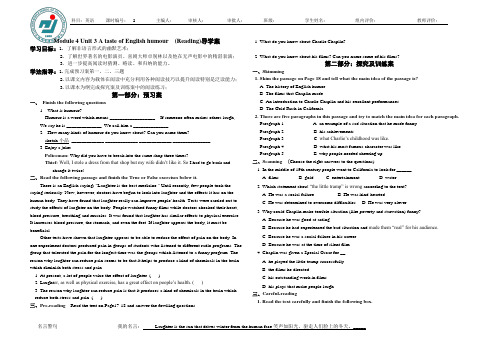
Module 4 Unit 3 A taste of English humour (Reading)导学案学习目标:1.了解非语言形式的幽默艺术;2. 了解世界著名的电影演员、喜剧大师卓别林以及他在无声电影中的精湛表演;3. 进一步提高阅读时猜测、略读、和归纳的能力。
学法指导:1.完成预习案第一、二、三题2.以课文内容为载体在阅读中充分利用各种阅读技巧以提升阅读特别是泛读能力;3.以课本为纲完成探究案及训练案中的阅读练习;第一部分:预习案一、Finish the following questions1.What is humour?Humour is a word which means __________________.If someone often makes others laugh, We say he is ______________. We call him a ______________.2.How many kinds of humour do you know about? Can you name them?sketch小品_____________ _____________ _____________ _______________3. Enjoy a joke:Policeman: Why did you have to break into the same shop three times?Thief: Well, I stole a dress from that shop but my wife didn’t like it. So I had to go back and change it twice!二、Read the following passage and finish the True or False exercises below it.There is an English saying; "Laughter is the best medicine." Until recently, few people took the saying seriously. Now, however, doctors have begun to look into laughter and the effects it has on the human body. They have found that laughter really can improve people' health. Tests were carried out to study the effects of laughter on the body. People watched funny films while doctors checked their heart, blood pressure, breathing and muscles. It was found that laughter has similar effects to physical exercise. It increases blood pressure, the stomach, and even the feet. If laughter appears the body, it must be beneficial.Other tests have shown that laughter appears to be able to reduce the effect of pain on the body. In one experiment doctors produced pain in groups of students who listened to different radio programs. The group that tolerated the pain for the longest time was the groups which listened to a funny program. The reason why laughter can reduce pain seems to be that it helps to produce a kind of chemicals in the brain which diminish both stress and pain.1. At present, a lot of people value the effect of laughter. ( )2. Laught er, as well as physical exercise, has a great effect on people’s health. ( )3. The reason why laughter can reduce pain is that it produces a kind of chemicals in the brain which reduce both stress and pain. ( )三、Pre-reading Read the text on Page17-18 and answer the fowlling questions.1. What do you know about Charlie Chaplin?2. What do you know about his films? Can you name some of his films?第二部分:探究及训练案一、Skimming1. Skim the passage on Page 18 and tell what the main idea of the passage is?A. The history of English humor.B. The films that Chaplin made.C. An introduction to Charlie Chaplin and his excellent performances.D. The Gold Rush in California.2. There are five paragraphs in this passage and try to match the main idea for each paragraph.Paragraph 1 A. an example of a sad situation that he made funnyParagraph 2 B. his achievementsParagraph 3 C. what Charlie’s childhood was like.Paragraph 4 D. what his most famous character was likeParagraph 5 E. why people needed cheering up.二、Scanning(Choose the right answers to the questions)1. In the middle of 19th century people went to California to look for ______.A. filmsB. goldC. entertainmentD. water2. Which statement abou t “the little tramp” is wrong according to the text?A. He was a social failure.B. He was kind-hearted.C. He was determined to overcome difficulties.D. He was very clever.3. Why could Chaplin make terrible situation (like poverty and starvation) funny?A. Because he was good at acting.B. Because he had experienced the bad situation and made them “real” for his audience.C. Because he was a social failure in his career.D. Because he was at the time of silent film.4. Chaplin was given a Special Oscar for __.A. he played the little tramp successfully.B. the films he directed.C. his outstanding work in films.D. his plays that make people laugh.三、Careful-reading1. Read the text carefully and finish the following box.BornJobFamous characterCostumeType of actingDied2. Put the events in the right order.( ) Chaplin tried cutting and eating the bottom of the shoe.( ) Chaplin and his friend rushed to the Alaska to pick up gold, but they failed.( ) They were so hungry that they boiled a pair of leather shoes.( ) They were caught in a small wooden house.( ) Chaplin cut off the leather top of the shoe.( ) Chaplin picked out the laces and ate.3. True or False:( ) 1) Chaplin was born in a rich family.( ) 2) People like the character “the little tramp” because he was a social failure.( ) 3) The Gold Rush was a film set in California at the beginning of the nineteenth century.( ) 4) Chaplin and hi s friend are so unlucky that they can’t find any gold.( ) 5) Chaplin has a delicious meal by eating meat in the film.( ) 6) Chaplin acted in films and wrote and directed films as well.第三部分:当堂检测一、短文填空(根据课文内容完成下面短文)Charlie Chaplin was born in a ________ family in ________and at that time film were silent. He wasa famous ________, especially in ________ and farce. His silent films are still popular today. Hischarming character was _______________, who was very poor, very__________even when people were________ to him. He was a social ________, and he was homeless, but he had ____________ toovercome difficulties. What he wore were ___________ shoes, large trousers and a ____________ hat,and he was always carrying a walking stick. Charlie Chaplin _______ in the film The Gold Rush. Heplayed a man with bad luck eating shoes with great ________ when he_____________ a snowstorm in asmall wooden house.二、Conclusion:Today we have learned something about humor. Humor is everywhere in our daily life. I hope youcan be optimistic(乐观的) no matter what difficulties you meet with, just as Charlie Chaplin was.Module 4 Unit 3 A taste of English humour (Reading)导学案答案第一部分:预习案一、 1.Humour is a word which means making others laugh. If someone often makes others laugh, We say he is humorous; We call him a humorist.2.sketch小品, jokes, mime哑剧, comedy 喜剧, funny stories, cross talk 相声, tongue twister绕口令二、FTF第二部分:探究案一、1. Charlie Chaplin was a great silent movie stars. He was very popular in his time.2. Modern Times, The Little Tramp, The Gold Rush, City Light are his masterpieces.Part 1 (Para.1)-C Part 2 (Para.2-4 )-A Part 1 (Para.5)-B二、1. D 2. 1-E; 2-C; 3-D; 4-A; 5-B 3. BDBCBorn 1889Job movie actorFamous character Little trampCostume large trousers, worn-out shoes, a small round black hat and a walking stick Type of acting mime (nonverbal)Died 1977, Switzerland2. 5132463. FFFTFT第三部分:训练案poor, 1889, actor, mine, a Little Tramp, kind, unkind, failure, determination, worn-out, small round black hat, starred, enjoyable, was caught in。
新课标高中英语必修四Unit3学案
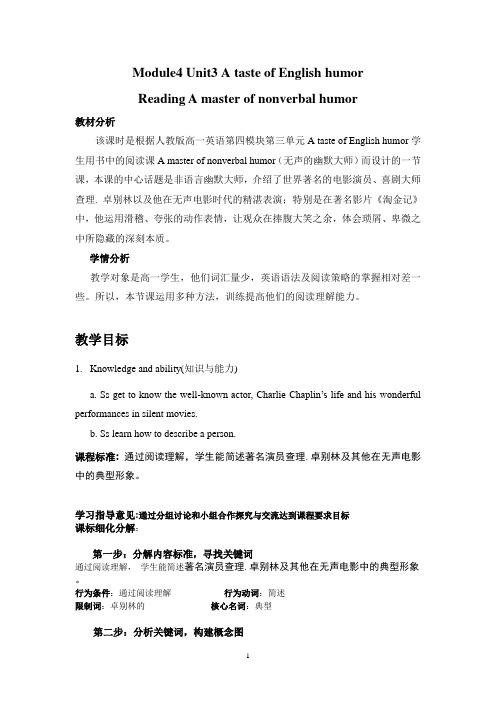
Module4 Unit3 A taste of English humorReading A master of nonverbal humor教材分析该课时是根据人教版高一英语第四模块第三单元A taste of English humor学生用书中的阅读课A master of nonverbal humor(无声的幽默大师)而设计的一节课,本课的中心话题是非语言幽默大师,介绍了世界著名的电影演员、喜剧大师查理. 卓别林以及他在无声电影时代的精湛表演;特别是在著名影片《淘金记》中,他运用滑稽、夸张的动作表情,让观众在捧腹大笑之余,体会琐屑、卑微之中所隐藏的深刻本质。
学情分析教学对象是高一学生,他们词汇量少,英语语法及阅读策略的掌握相对差一些。
所以,本节课运用多种方法,训练提高他们的阅读理解能力。
教学目标1.Knowledge and ability(知识与能力)a. Ss get to know the well-known actor, Charlie Chaplin’s life and his wonderful performances in silent movies.b. Ss learn how to describe a person.课程标准:通过阅读理解,学生能简述著名演员查理.卓别林及其他在无声电影中的典型形象。
学习指导意见:通过分组讨论和小组合作探究与交流达到课程要求目标课标细化分解:第一步:分解内容标准,寻找关键词通过阅读理解,学生能简述著名演员查理.卓别林及其他在无声电影中的典型形象。
行为条件:通过阅读理解行为动词:简述限制词:卓别林的核心名词:典型第二步:分析关键词,构建概念图根据概念图,确定行为条件第四步综合上述思考,写出学习目标:内容主题:必修4 Unit3: A master of nonverbal humor学习目标:通过阅读理解,学生能准确无误的简述查理.卓别林及其他在无声电影中的典型形象。
英语必修4unit3导学案
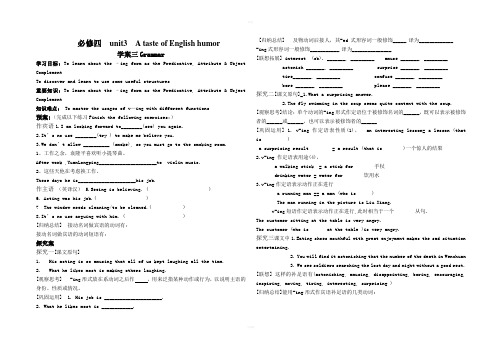
必修四unit3 A taste of English humor学案三Grammar学习目标: To learn about the –ing form as the Predicative, Attribute & Object ComplementTo discover and learn to use some useful structures重要知识: To learn about the –ing form as the Predicative, Attribute & Object Complement知识难点: To master the usages of v—ing with different functions预案:(完成以下练习Finish the following exercises:)作宾语1.I am looking forward to________(see) you again.2.It’s no use ________(try ) to make me believe you.3.We don’t allow __________ (s moke), so you must go to the smoking room.1、工作之余,袁隆平喜欢听小提琴曲。
After work ,YuanLongping______________________to violin music.2、这些天他在考虑换工作。
These days he is______________________his job.作主语(英译汉) 5.Seeing is believing. ( )6. Acting was his job.( )7 The window needs cleaning/to be cleaned.( )8.It’s no use arguing with him.( )[归纳总结] 接动名词做宾语的动词有:接动名词做宾语的动词短语有:探究案探究一[课文原句]1. His acting is so amusing that all of us kept laughing all the time.2. What he likes most is making others laughing.[观察思考] -ing形式放在系动词之后作,用来泛指某种动作或行为,以说明主语的身份、性质或情况。
人教版高中英语必修4 Unit3学案:3.1[4页]
![人教版高中英语必修4 Unit3学案:3.1[4页]](https://img.taocdn.com/s3/m/235807b6783e0912a3162a46.png)
Unit 3 A taste of English humourPeriod 1 新知预习课学习目标1.Memorize the spelling and meaning of the important words in this part:entertain,astonish,overcome,convince,direct,particular,etc.e the following phrases to make simple sentences:badly off,up to now,pick out,cut off,star in,etc.识记词汇1.Fill in the chart below and note the connection between the nouns,verbs,adjectives and adverbs.Noun Verb Adjective Adverbfortunecontentmentperformhumourastonishmentborecharmentertainment精讲词汇1.astonish vt.使惊诧【完成句子】(1)We were that he turned up at the party.我们都很惊奇他会在聚会上出现。
(2)He stood there,looking .他站在那儿,看起来很惊诧。
(3)There was an look on her face.她的脸上充满惊奇。
(4)His success was really .他的成功令人惊奇。
astonish有两个形容词形式: 和 。
一般情况下, 用来修饰物, 用来修饰人。
但当用于修饰人的表情、眼神等时,应用 。
2.entertain v.使欢乐;款待(1)He will entertain his friends dinner this evening.今晚,他将会宴请他的朋友。
(英语教案)高中英语必修四unit3教案
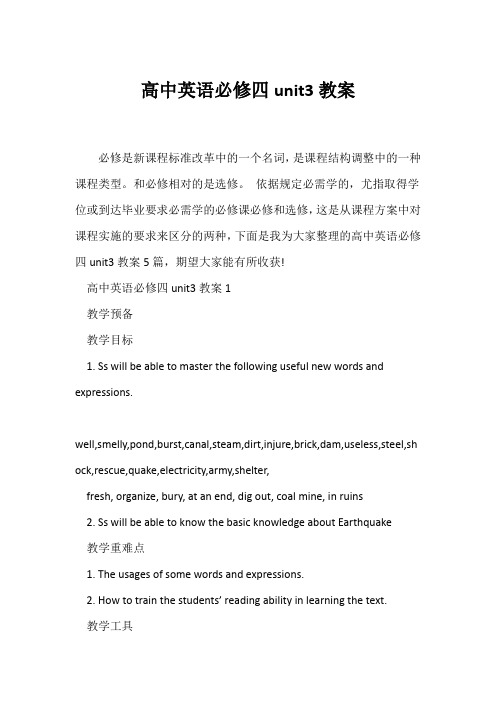
高中英语必修四unit3教案必修是新课程标准改革中的一个名词,是课程结构调整中的一种课程类型。
和必修相对的是选修。
依据规定必需学的,尤指取得学位或到达毕业要求必需学的必修课必修和选修,这是从课程方案中对课程实施的要求来区分的两种,下面是我为大家整理的高中英语必修四unit3教案5篇,期望大家能有所收获!高中英语必修四unit3教案1教学预备教学目标1. Ss will be able to master the following useful new words and expressions.well,smelly,pond,burst,canal,steam,dirt,injure,brick,dam,useless,steel,sh ock,rescue,quake,electricity,army,shelter,fresh, organize, bury, at an end, dig out, coal mine, in ruins2. Ss will be able to know the basic knowledge about Earthquake教学重难点1. The usages of some words and expressions.2. How to train the students’ reading ability in learning the text.教学工具课件教学过程Step I lead-inLet students see a short video and answer the questions1.What happened in the video Earthquakes2.How do you feel seeing the plots(情节) Students’ discussion. Step II Fast reading1. What is the passage mainly about In Tangshan ,earthquakes happened on July 28th 19762. Skim the text and answer the questionsThe type of writing (写作体裁)Narrative writingTopic sentence of Paragraph 1Sentence 1Topic sentence of Paragraph 2Sentence 2Topic sentence of Paragraph 3Sentence 1Topic sentence of Paragraph 4Sentence 1Step III Detailed readingAsk students to read the text carefully and answer the questionsTask1: What were the nature signs of the coming earthquake(选择)Para 11.Water in well( G )2. Well walls(D )3.Chickens pigs(F ) 4 .Mice (A)5.Fish(E )6. Bright lights( B)7. Water pipes(C )A. Ran out of fieldsB. in the skyC. Cracked and burstD. Deep cracksE. Jumped out of pondsF. Too nervous to eatG. Rose and fell, fell and roseTask 2 Fill in the blanksMain IdeaDetailsDamage caused byearthquakePara 2-3At _____ am, the __________ earthquake of the 20th century began . _______ burst from holes in the ground.Hard hills of the rock became rivers of ____.________ covered the ground like red autumn leaves.Two _______ and most of the bridges fell.The railway tracks were now _________pieces of _______.______ now filled the wells instead of water.Water,food,and ______________ were hard to get.The reconstruction(重建) after the earthquakePara 41. The army _____________2. Workers ____________for survivors.3._____________was taken to the city.Details:1. At 3:42 am, the greatest earthquake of the 20th century began.2. Steam burst from holes in the ground.3. Hard hills of the rock became rivers of dirt.4. Bricks covered the ground like red autumn leaves.5. Two dams and most of the bridges fell.6. The railway tracks were now useless pieces of steel.7. Sand now filled the wells instead of water.8. Water, food, and electricity were hard to get.Step IV consolidation (当堂稳固)Let students fill the blanks according to the passageStrange things were happening in the countryside of northeast Hebei. For three days the water in the village wells kept rising and1_________(fall). Farmers noticed that the well walls had deep cracks 2___________ them. A smelly gas came out of the cracks. In3_________farmyards, the chickens and even the pigs were too nervous 4__________(eat). 5_________(mouse) ran out of the fields looking for places 6________(hide). Fish jumped outOf their bowls and ponds. At about 3 am on July 28,1976, some people saw bright lights 7_________ the sky. The sound of planes could 8________(hear) outside the city of Tangshan even 9_________ no planes were in the sky.In the city, the water pipes in some buildings cracked and burst. But the one million people of the city, ________thought little of these events, were asleep as usual that night.1 falling2 in3 the4 to eat5 mice6 to hide 7in 8 be heard 9when 10 who这局部目的是让同学进一步稳固课文的内容。
- 1、下载文档前请自行甄别文档内容的完整性,平台不提供额外的编辑、内容补充、找答案等附加服务。
- 2、"仅部分预览"的文档,不可在线预览部分如存在完整性等问题,可反馈申请退款(可完整预览的文档不适用该条件!)。
- 3、如文档侵犯您的权益,请联系客服反馈,我们会尽快为您处理(人工客服工作时间:9:00-18:30)。
Module 3 Body language and non-verbal communicationPeriod I Speaking, listening and readingWarm-up What is body language/ non-verbal communication?Body language is the m_____________ or p_____________ of our body that show other people what we are t___________ or f______________.Non-verbal communication is communication not involving words or speech but using g_________, e_____________ of the face, etc.Step 1.Do activity 1 and 3 on page 21.Activity 3 Say what you do especially in terms of body language when you…1. meet a friend___________________________________________________________________2. show someone the way __________________________________________________________3. see a friend in the distance ________________________________________________________4. enter a friend’s house ____________________________________________________________5. say yes ________________________________________________________________________6. say no ________________________________________________________________________7. say who? Me? __________________________________________________________________8. say goodbye ___________________________________________________________________ Step 2 Fast reading1.Choose the best title2.Try to find the topic sentence or the main idea of each paragraph.Step 3 Detailed reading1. Read the passage carefully and do activities 2 and 3 on page 23. While doing activity 2, do correctthe false statements.2. Answer the following questions:(1) How many ways do we have to communicate with each other?_______________________________________________________________________________ (2) Why is it that in every culture there is a formal way to greet strangers?________________________________________________________________________________ (3) Why does the write say people give away much more by their gestures than by their words?________________________________________________________________________________ 3.Finish the tasks about the passage in section B1 in our newspaper.Step 4 language focusI. Complete the important sentences from the passage and study them carefully.1. If you say the word “communication”, most people ______________ words and sentences.2. Although these are very important, we communicate with ______________ just spoken and ____________ words.3. Indeed, body positions are part of ____________we call “body language”.4. We see examples of _____________ body language very often, _________ there is also “learned” body language, ________________________________________..5. We use “learned” body language when we ____________________________ strangers.= We use “learned” body language when ____________ _____ strangers6.__________ other animals, we are _________________ until we know it is safe to relax.7. So every culture has developed ______________________to greet strangers, to show them we arenot aggressive.8. If our right hand is busy ______________someone, it cannot be ________________ a weapon.9. We shake hands when we make a _______________.10. Greetings in Asian countries do not __________ _________ the other person, but they alwaysinvolve the hands.11. Muslims give a “salaam”, ______________ they touch their heart, mouth and forehead.12. Hindus _______________ their hands and bow their heads ____________________.13. One person then _______________ his hand, palm outwards and five fingers _____________14. Nowadays, it is _________ a ________________ greeting.15. People _______________________ much more by their gestures than by their words.16. Look at your friends and family and see if you are a _______________!= …if you can ________________________________________________________________.II. Further study1. more thanThey are more than satisfied. = ____________________________.What he said is more than enough.= __________________________________They beauty of the lake is _________________________________这湖之美难以描述。
This is more than ___________________. 这事我做不了。
He is ______________ a teacher. He is my good friend.2. hold up :举起,抬头,支撑,搀扶;延误,阻碍(delay),使停顿He passes me, __________________ his head.高昂着头The building of the new road has been held up by bad weather.hold backhold on hold on (to sb\ sth)1) They managed to ____________ until help arrived.2) He ______________ the back of the chair to stop himself falling.3) Do you think it is good to _____________ something from our parents?4) I didn’t know why but I just couldn’t _______________ my tears.5) She ____________, not knowing how to break the terrible news.6) An accident is _______________ traffic.3. Give away:His heavy Irish accent give himself away. ____________________________________________________________________________________________________________________他决定把所有的藏书都捐赠给这个村子。
